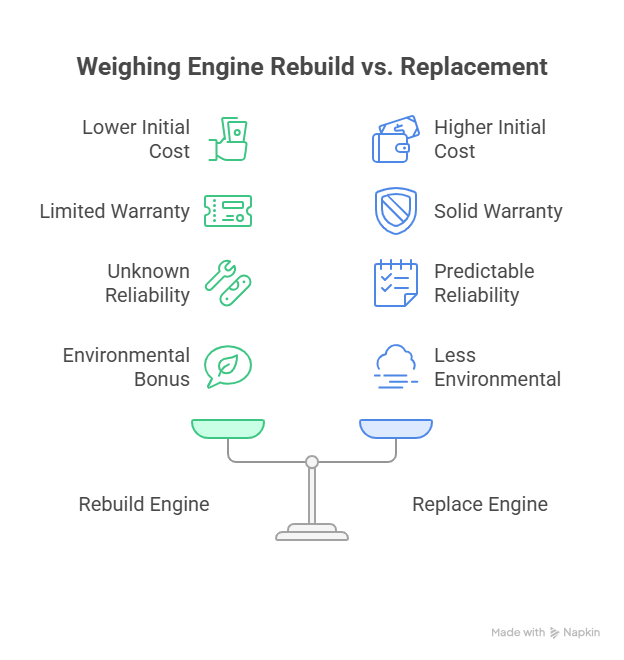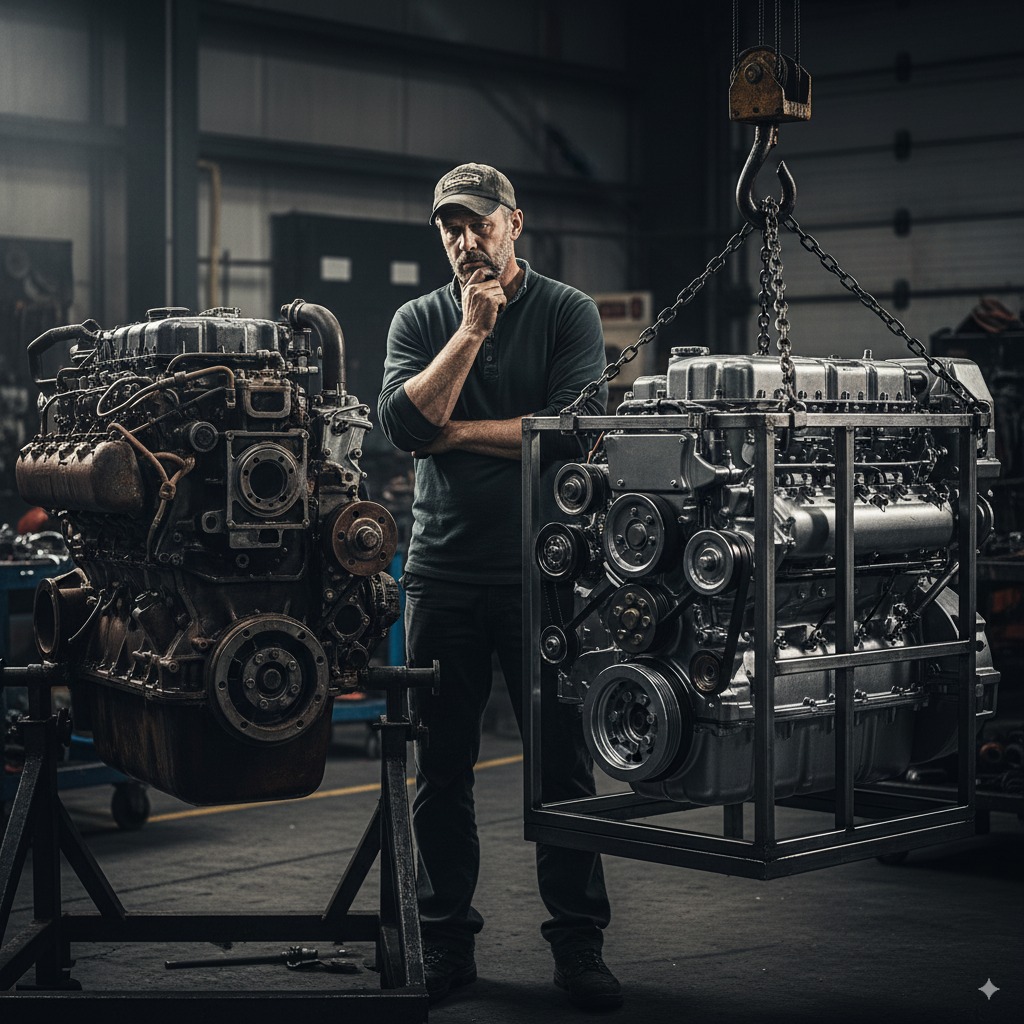I’ve been a marine mechanic in South Florida for over 15 years, and there’s a look I’ve seen a hundred times. It’s the face of a boat owner who just heard their engine has given up the ghost. The next words out of their mouth are always the same: “Is it cheaper to rebuild my engine or replace it?”
That’s the million-dollar question, isn’t it? And if anyone tells you there’s a simple answer, they’re either lying or trying to sell you something. The truth is, this decision is about way more than just the upfront cost. It’s about reliability, peace of mind, and the future of your boat.
I had a client last season, Mark, with a beautiful old Carver. His diesel was shot. He was leaning toward a rebuild to save some cash. We started the teardown, and what did we find? A cracked block that was invisible from the outside. That “cheaper” rebuild just got a whole lot more expensive.
This guide is the conversation I have with every owner facing this dilemma. We’ll break down the real costs, the hidden risks, and help you answer the tough question: is it cheaper to rebuild my engine or replace it?
Table of Contents
The Rebuild Route: The Good, The Bad, and The Oily
What a Rebuild Actually Is
First off, a rebuild isn’t just swapping out a few spark plugs. It’s major surgery. We pull the engine, tear it down to the bare block, and clean every single part. We inspect everything—the crankshaft, the cylinders, the head—for wear and damage. Then, we replace all the “wear” items: pistons, rings, bearings, gaskets, seals. The goal is to bring it back to factory specs. It’s a meticulous, labor-intensive job.
The Cost Breakdown
When people ask, “Is it cheaper to rebuild my engine or replace it?”, the initial numbers for a rebuild often look tempting. For a common marine diesel, you’re typically looking at $4,000 to $12,000. But that’s a big range for a reason. A smaller engine with minor wear might be on the lower end. But if we find hidden damage like Mark’s cracked block, the cost can spiral. Parts for older or obscure engines can also be a nightmare to find and expensive when you do.
The Upside of Rebuilding
The biggest pro is obvious: it’s usually less cash out of your pocket upfront. If the engine’s core is solid and the damage isn’t catastrophic, you can save thousands. For owners of classic boats, it also preserves the vessel’s originality, which is a big deal for some. You’re also recycling a major component, which is a nice environmental bonus.
The Risks You Take
This is the part that makes me cautious. The biggest risk is the unknown. You don’t know what you’ll find until the engine is in pieces on the shop floor. And then there’s the warranty—or lack thereof. Most rebuilds come with a very limited warranty, maybe 30-90 days on labor. You’re often flying without a net. If that rebuilt engine fails 6 months later, you’re likely back at square one. This is a critical factor when considering if it is cheaper to rebuild my engine or replace it.
The Replacement Route: New vs. Remanufactured
What Are Your Options?
When you replace, you’re usually looking at two choices:
- Brand New (Crate Engine): Straight from the manufacturer (e.g., Volvo Penta, Yanmar), with zero hours and the latest technology.
- Remanufactured: A used engine that has been completely rebuilt in a factory setting to original specs, often with new parts and rigorous testing.
The Cost of a Fresh Start
A replacement is a bigger check to write, no doubt about it. You’re looking at $10,000 to $30,000+, including installation. A small diesel might be on the lower end, but a larger engine, or one that requires significant modifications to your boat to fit, can easily push the price up. This cost includes the engine itself, labor for removal and installation, and any changes needed for mounts, shafts, or exhaust.

The Big Advantages
So why spend the extra money? Peace of mind. A new or remanufactured engine comes with a solid multi-year warranty. You know exactly what you’re getting, with predictable costs. You also get the benefit of modern technology—better fuel efficiency, quieter operation, and easier diagnostics. For someone who relies on their boat for serious cruising or commercial work, this reliability is huge. The question of is it cheaper to rebuild my engine or replace it becomes less about the initial cost and more about the long-term value.
The Downsides
The upfront cost is the main hurdle. It’s a significant investment. You also might run into compatibility issues. Sometimes, getting a new engine to play nice with your old boat’s controls, propeller shaft, or wiring can be a real can of worms, adding to labor costs.
Quick Comparison: Rebuild vs. Replace
To make it easier, here’s a cheat sheet I give my clients.
| Feature | Engine Rebuild | Engine Replacement (New/Reman) |
|---|---|---|
| Upfront Cost | Lower ($4k – $12k) | Higher ($10k – $30k+) |
| Hidden Costs | High Risk | Low Risk |
| Warranty | Limited or None | Multi-Year, Comprehensive |
| Reliability | Depends on core/work | Very High |
| Downtime | Can be long if parts are rare | Generally quicker |
| Resale Value | Moderate increase | Significant increase |
How to Make the Right Call
So, how do you decide? Here are the questions I ask my clients to help them figure out if it is cheaper to rebuild my engine or replace it for their specific situation.
- How Bad Is It, Really? Get a professional diagnosis. If the block is cracked, it’s been submerged in saltwater, or it’s thrown a rod, replacement is often the only smart move. If it’s just worn out from high hours, a rebuild is a strong contender.
- What’s Your Boating Style? Are you a weekend cruiser sticking close to home? A quality rebuild might be perfect. Are you planning to cross oceans or run charters? The reliability and warranty of a new engine are probably worth the investment.
- Can You Even Get the Parts? For some older engines, parts are either impossible to find or ridiculously expensive. A quick search for major components can help answer the question of whether it is cheaper to rebuild my engine or replace it.
- What’s Your Budget vs. Your Timeline? A rebuild might be cheaper, but if it takes three months to get parts, that’s a lost season on the water. A replacement is often faster.
FAQ: Quick Answers from the Dock
What’s the first sign I might need a major overhaul?
Heavy blue or white smoke, a persistent knocking sound (not just a tick), or metal shavings in your oil are all big red flags. Don’t ignore them.
Is a remanufactured engine as good as new?
Pretty much. They are rebuilt in a controlled factory environment and rigorously tested. They are a great way to get near-new reliability for less than a brand-new price.
How long does a rebuild take vs. a replacement?
A replacement can often be done in a week or two. A rebuild? It depends entirely on parts availability. I’ve seen them take anywhere from two weeks to three months.
Will a new engine increase my boat’s value?
Absolutely. It’s one of the single biggest upgrades you can make to an older boat and a huge selling point. The question then becomes not just is it cheaper to rebuild my engine or replace it, but what is the better investment.
What’s the biggest mistake owners make?
Trying to “cheap out” on a diagnosis. They’ll have a buddy look at it or try to guess the problem. A few hundred dollars for a proper mechanical survey can save you thousands in the long run by helping you make the right choice from the start.
The Bottom Line
So, is it cheaper to rebuild my engine or replace it? As you can see, there’s no magic answer. It’s a strategic choice based on your boat, your budget, and your boating life.
If your engine has a solid core and you’re comfortable with a little more risk for significant upfront savings, a rebuild can be a great option. If you need iron-clad reliability, a long-term warranty, and have the budget for it, a replacement is almost always the better investment.
My final advice? Don’t make this decision alone. Find a mechanic you trust, pay for a thorough diagnosis, and have an honest conversation about how you use your boat. That’s how you’ll make a choice you won’t regret when you’re miles from shore.
Author Bio
I’m Alex, a 15-year marine technician in South Florida, ABYC-certified. I’ve probably rebuilt or replaced over 200 marine engines, from small Yanmars to massive CATs. I’ve seen it all at marinas like Dinner Key and Bahia Mar, and I help boat owners make tough decisions that keep them safely on the water.


Leave a Reply